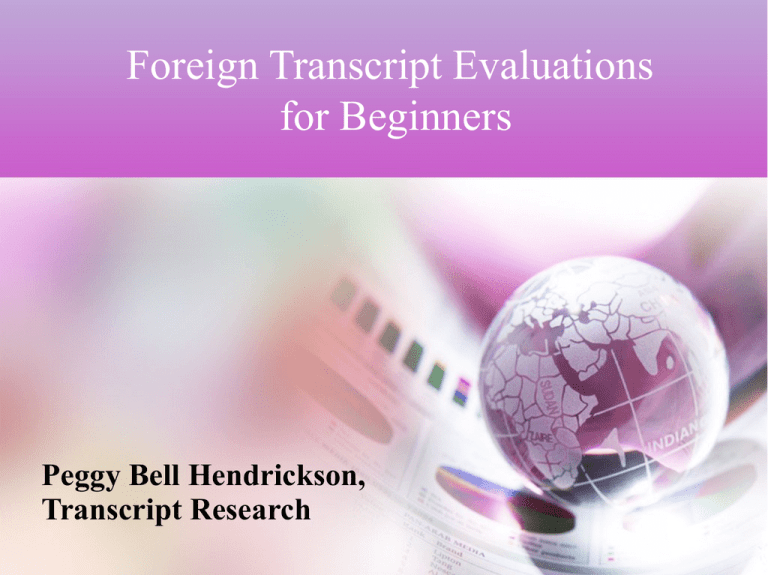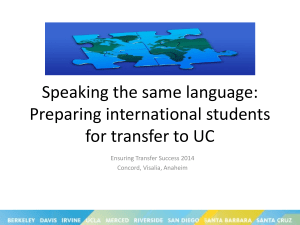Foreign Transcript Evaluations for Beginners
advertisement

Foreign Transcript Evaluations for Beginners Peggy Bell Hendrickson, Transcript Research Basics Training, Conferences, and Workshops ● NAFSA Academy ● NAFSA State/Regional/National Meetings ● NAFSA Webinars ● AACRAO Winter/Summer Institutes ● AACRAO State/Regional/National Meetings ● ECE Webinars ● WES Webinars (including archives) ● Others Basics Asking Questions Online ● ● ● ● The Connection: http://theconnection.ece.org/Home Inter-L – International Education Networking: http://groups.yahoo.com/group/inter-l/ NAFSA Admissions and Credential Evaluation (ACE) Network: http://www.nafsa.org/groups/forums.aspx?boardid=2694 Texas International Education Specialists: tex-intl-specialists@utlists.utexas.edu Resource Library Creating a Resource Library ● Start Big then Grow Smaller – – – Focus on larger resources (multi-country books, CDs, databases) covering many countries Identify target countries/regions and then focus on them for specific, complex credentials Save everything, even (especially?) email correspondence Resource Library Print/Physical Library ● ● ● ● ● ECE publications: http://publications.ece.org/ AACRAO publications: http://aacrao.org/publications/publications_catalog.aspx Europa World of Learning: http://www.educationarena.com/europa/#link3 IERF publications: http://ierf.org/index.php/institutions/country_index/ International Handbook of Universities: http://www.iau-aiu.net/content/reference-publications Resource Library Electronic Library – Databases ● AACRAO EDGE: http://edge.aacrao.org/ ● AEI-NOOSR: http://www.aei.gov.au/CEP ● ● ● Eurypedia from Eurydice: http://eacea.ec.europa.eu/education/eurydice/eurybase_ IAU Higher Education Systems: http://www.iau-aiu.net/content/he-systems IAU List of Universities: http://www.iau-aiu.net/content/list-heis ● UK NARIC: http://naric.org.uk/index.asp?page=35 ● World Higher Education Database: Resource Library Electronic Library – Publications ● ● ● EducationUSA: https://www.educationusa.info/secure/login.php IQAS: http://employment.alberta.ca/immigration/5218.html NORRIC: http://norric.org/files/education-systems/ NUFFIC: http://www.nuffic.nl/international-organizations/services/ ● ● Online Guides to Ed. Systems around the World: http://www.nafsa.org/publication.sec/epublications/online Researching Int'l Education Systems & Institutions: http://www.transcriptresearch.com/Research.pdf Evaluation Fundamentals Major Education Systems ● ● ● ● US: 6+6, leads to high school diploma; Ex: China, Japan, Korea, Mexico, Saudi Arabia, Taiwan British: 6+5+2, leads to O levels & A levels (some moved to 12 year); Ex: Australia, Bangladesh, Canada, Ghana, India, Kenya, Nigeria, Zimbabwe French: 6+7, leads to Bacc; Ex: Benin, Cameroon, Canada (Quebec), Morocco, Togo Russian: 4+5+2, leads to Cert of Sec Complete Gen Ed; Ex: Bulgaria, Poland, Ukraine, Uzbekistan Evaluation Fundamentals General Rules for Credits ● One year of credit = one year of credit ● One year FT study = 30-32 semester credit hours ● 4 year bachelor = 120-128 (maybe up to 140) hours ● Contact Hours: – – – 15 class hours → 1 semester hour 45 class hours → 3 semester hours 45 lab hours → 1 semester hour Evaluation Fundamentals Quarter Hours – 2 Strategies ● Math: – – ● Quarter Hours * 2/3 = Semester Hours Ex: 4 q.h. * 2/3 = 2.67 = 2.7 s.h. Estimate: – – – – – 1 q.h. = 0.5 s.h. 2 = 1.5 3 = 2.0 4 = 2.5 5 = 3.5 6 = 4.0 7 = 4.5 8 = 5.5 9 = 6.0 10 = 6.5 Evaluation Fundamentals Vocational/Technical Studies ● ● ● ● What are your institution's policies for domestic applicants/transcripts from vocational/technical? Do you have Applied Arts/Sciences programs? Do you determine credit hours earned in transfer, or credits towards degree plan? Would a syllabus make a difference? Evaluation Fundamentals Three-Year Degrees ● Things to Consider: – – – – – Upper secondary education Equitable years of study vs. learning outcomes Preparedness for Graduate School – same field? What they can do at home Bologna-compliant degrees vs other 3-year programs? ● Leveling Courses/Bridge Program ● Document Your Policies and Be Consistent! General Strategies ● Things to Organize ● Country Sheets ● Grading Scales ● Equivalencies ● Country Files ● Samples General Strategies Country Sheets ● Overview of Education System ● Maintain your grading scales and sources ● Identify higher ed institutions, sources, or both ● Keep track of your equivalency determinations ● Encourages consistency among multiple evaluators ● Allows for repeatable outcomes for infrequent evaluations General Strategies Grading Scales ● ● Country-specific Publications ● Databases (EDGE, AEI, WHED, etc.) ● EducationUSA Country Fact Sheets ● NAFSA ADSEC/wRAP-Up Newsletters ● NAFSA Guides (print from 1999, online current) ● New Country Index ● Transcripts ● WES Grade Conversions Save your sources & info – be consistent! General Strategies Calculating the GPA ● ● Simplified GPA vs. Weighted GPA Indigenous overall grade – degree class, major subjects ● +/- Grades ● GPA Calculator (Google: GPA Calculator xls) ● ● Course repeats – include in GPA? Exclude if only repeated once? Exclude if institution excludes? Last two years / upper division vs. overall General Strategies Equivalencies ● ● ● ● Counting years? National Council rec? Database rec? Campus interest (recruiter, dean, professor)? Look at education patterns so applicants from same region/education system are treated consistently If making an exception or dealing with a new credential, be sure to document it just in case You can't always be “fair”, but you can be consistent General Strategies Country Files ● ● ● ● Likely both a physical and electronic file (unless you've gone paperless) Primary location(s) for storing data you have collected on country Examples: summaries of emails, saved web pages, conference handouts/presentations, articles, ebooks, evaluation notes, scanned documents, etc. Make it accessible to all but changeable by few General Strategies Samples ● AACRAO EDGE ● EducationUSA ● Index of Secondary Credentials, IERF ● ● ● ● Ministry (Russian ENIC): http://www.russianenic.ru/rus/diplom.html NAFSA ADSEC/wRAP-Up Newsletter Shelby's Big Book of Samples: http://shelbycearley.wordpress.com/manuals/ Workshop, presentations Building Country Files/Requirements Examples for Secondary-Level Studies Concordia University: http://www.concordia.ab.ca/sites/default/files/Entry_Level_International_Cr NCAA: http://fs.ncaa.org/Docs/eligibility_center/ECMIP/Intl_Acad_Credential_Reso Josef Silny: http://www.mdc.edu/internationalstudents/images/guide.pdf University of the Fraser Valley: http://www.ufv.ca/Assets/Admissions+and+Records/Admissions/intlgrad.pd University of North Texas: http://international.unt.edu/node/648 University of Texas at Dallas: http://www.utdallas.edu/enroll/apply/documents/Required%20Secondary% Building Country Files/Requirements Examples for Post-Secondary Studies Clemson University Study Abroad: http://www.registrar.clemson.edu/pdf/itcel.pdf Duke University: http://gradschool.duke.edu/documents/admissions/Credentials.pdf Sussex University: http://www.sussex.ac.uk/psychology/internal/documents/pg-quals-handboo University of Waterloo: http://www.grad.uwaterloo.ca/forms/admissions/placementguide.pdf University of Wisconsin-Madison: http://www.grad.wisc.edu/admin/gradcoordinators/iadmiss/countrylist.html Evaluation Blueprint ● Applicant Data ● Secondary vs. Post-Secondary ● Native Language Evaluation Blueprint Application Data ● ● What was the applicant's age at time starting and ending studies? Does applicant have educational history that makes sense given the country/countries? ● What does applicant say s/he has? ● What level of study is application for? ● Do the document support that level? Evaluation Blueprint Secondary Evaluations – National Exams ● ● ● ● Is the applicant applying from a country with a national leaving exam? If so, does your institution require high school transcripts and the leaving exam, or just the exam? Do you verify national exams? Require originals? How do you handle incomplete programs for countries with a leaving exam? ● Do you accept more than one sitting of the exam? ● What is your minimum “GPA”? Evaluation Blueprint Secondary Evaluations – Graduation Diplomas ● ● ● ● Do you require high school transcripts in addition to graduation diplomas? Do you calculate a GPA or look for minimum grades in certain subjects? If you use a GPA, is it a simple GPA or weighted? Are your freshman admits eligible for scholarships? Is there a different procedure for non-ranking schools (most international secondary schools)? Evaluation Blueprint Secondary Evaluations – Advanced Credit ● ● ● Do you award any advanced standing/advanced credit for secondary studies taken in “year 13” from the British A/S Levels, German Abitur, French Bac? If so, how do you handle countries that have a similarly named credential awarded after a different number of years? (Hong Kong A Level) Does your office process IB diplomas/certificates? Evaluation Blueprint Post-Secondary Evaluations – Preparation ● Do you require secondary records or just academic history (or neither)? ● Is the applicant's indigenous program completed? ● Has the applicant provided graduation documents? ● ● Are the documents issued by the institution in English, or do you have both English and native language documents? Are they official (or documents you will accept by institutional policy)? Evaluation Blueprint Post-Secondary Evaluations – Recognition ● ● ● ● Who are the higher education authorities? Is it a stand-alone institution or affiliated to someone else (autonomous, affiliated, constituent college, Listed Body vs. Recognized Body, etc.)? Is program recognition required for that country? Is it a technical, vocational, or professional organization or program? Do you accept that? Evaluation Blueprint Post-Secondary Evaluations – Evaluation ● What is the standard duration of the program? ● How much has the applicant completed? – – Graduated – do you have degree/diploma/certificate or other proof of completion? Incomplete – do you have syllabus/degree plan/study plan? ● What is your equivalency? ● Establish your baseline of credits ● Identify your grading scale conversion Evaluation Blueprint Native Language Documents ● ● ● ● ● Translations are often too “helpful” Names of institutions may be easier to identify with indigenous terms/symbols Verbal grades & Arabic #s are often mistranslated Learn to read or transliterate numbers and names of graduation credentials to spot check grades, confirm names of schools, and confirm credential Set policy on acceptable translations Thank You! Researching International Education Systems and Institutions updated February 2012 http://www.transcriptresearch.com/Research.pdf This presentation is available online at: http://www.transcriptresearch.com/Beginners.pdf Peggy Bell Hendrickson peggy@transcriptresearch.com

